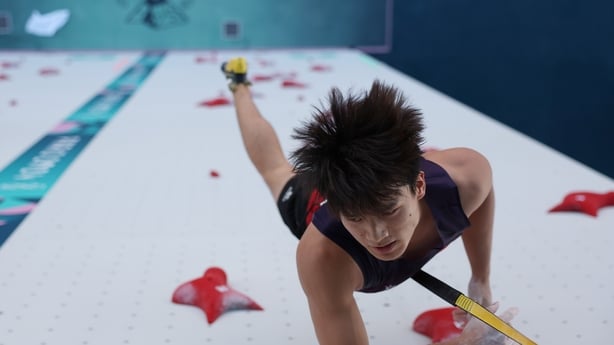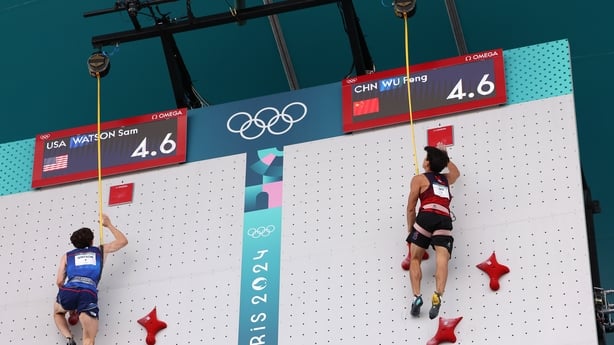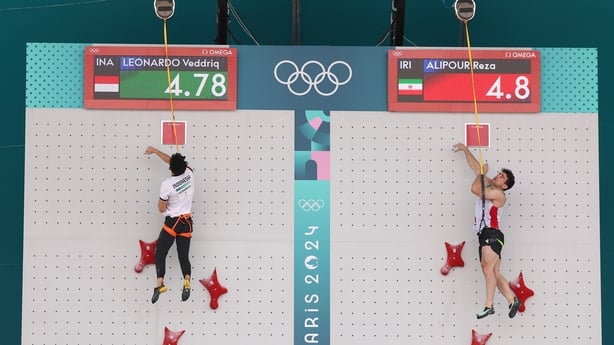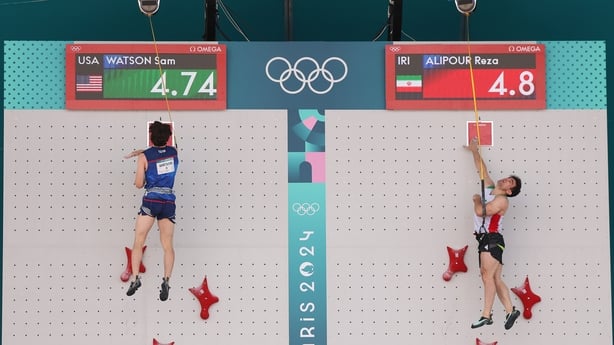We marvel at 100m sprinters on the track who clock under ten seconds.
Of course, medals are given out for that. But there is another sport, where silverware for doing what's asked of you in half that time, is also awarded.
And that is in the 'speed' competition of sport climbing, which was introduced at the Tokyo Games and today saw the medals awarded in the men's competition at the Paris Games.
Before we go any further, let's have a brief overview.
It's rock climbing held indoors on an artificial climbing wall.
Or if you really want to use your imagination and think of it on a bigger scale, it's Sylvester Stallone fighting off the baddies in 'Cliffhanger' or Clint Eastwood looking for revenge in 'The Eiger Sanction'.
Journey's classic getting the crowd involved at the men's speed final in the sport climbing competition #Paris2024 #SportClimbing pic.twitter.com/TrkAxriWP1
— James McMahon (@mcmahon31j) August 8, 2024
But back to reality. 1985 saw the first internationally recognised sports climbing competition and in 1989 we had the first World Cup. In time came the formation of the International Federation of Sport Climbing that the International Olympic Committee provisionally recognised.
In August 2016, the IOC announced that competition climbing would be a sport in the 2020 Summer Olympics.
As well as the speed competition, bouldering and lead climbing make up the trio of disciplines within the sport.
Speed climbing: Two climbers face off on a 15-metre-high wall, sloped at 95-degree angle. Whoever reaches the top first is the winner, which usually takes just five seconds for male climbers and slightly over six seconds for women.
Bouldering: Climbers have four minutes to climb a four-metre high wall based on route difficulty, with higher points awarded for the greater difficulty. This discipline is completed without a safety rope.
Lead climbing: Competitors have six minutes to climb as far up a 15-metre wall as they can. They only have one chance to climb. If they fall, the top height they reached is recorded as their score.
At the Tokyo Games, the above three disciplines were combined into a single medal event. For Paris, however, the combination of lead climbing and bouldering would be a single medal, with speed climbing a standalone event.
The focus from here on will be on the speed discipline. At the Olympics, in qualifying, competitors race in pairs in lane A and lane B. They don't race against against each other, only against the clock.
Each participant races twice, once in each lane, and the eight fastest competitors then make it through to to the knockout phase. Quarter-finals; semi-finals, and the final are run off like a blitz to determine gold, silver and bronze.
The Le Bourget Climbing venue, to the north of Paris, is where the action took place.
Along with the Aquatic Centre in Saint-Denis, it is the only sports facility to be built specifically for Paris 2024.
Sport climbing's speed event at #Paris2024 and Sam Watson from the USA just about wins his quarter-final #SportClimbing pic.twitter.com/HD9w1XEZnp
— James McMahon (@mcmahon31j) August 8, 2024
The venue was packed for the conclusion of the men's competition. First up in the quarters was 18-year-old Sam Watson from the USA against New Zealand's David Julian. And off they descended and before we knew it it was over; Watson prevailed in 5.03 seconds. More from Watson later.

World champion Matteo Zurloni was then edged out by Peng Wu (above) from China.
Indonesia's Veddriq Leonardo was too quick for home favourite Bassa Maawem, while Reza Alipour from Iran then ascended quicker up the wall than Kazakhstan's Amir Maimuratov.
And so we had our four semi-finalists. There was no time to wait; two minutes had passed before it was Sam Watson v Wu Peng.

The latter touched the all-important red mark first in 4.85 seconds.

The other semi saw Leonardo v Alipour. Again fine margins decided it, with the former coming out on top.
And so we had our final: China v Indonesia.
But before that we had the run-off for bronze, with Sam Watson up against Reza Alipour. Watson set a new world record in April, clocking 4.79. He bettered that (4.75) on Tuesday in the elimination heat. Could he break it again? Yes, he could, bringing it down to 4.74 as he got the better of Alipour.

And so the ascent to decide gold: Wu v Leonardo. A thrilling conclusion to the blitz saw Leonardo in 4.75, just shade it, with Wu clocking 4.77.
How gold was won
And then it was over; the day's entertainment all wrapped up in 25 minutes. A form of fast-food sporting entertainment. Some will be reminded of squirrels scurrying up a tree or the resident cat in pursuit of a robin on its perch.
All present seemed to enjoy the frantic pursuit of that red mark. And shortly afterwards the medals were handed out.
Watch the 2024 Olympic Games with 14 hours of televised action on RTÉ2 and RTÉ Player each day. Listen to extensive radio coverage on RTÉ Radio 1 and 2fm's Game On and follow each moment from Paris on RTÉ.ie, the RTÉ News app and all RTÉ digital platforms. Listen to the daily RTÉ Sport Olympics Podcast.



